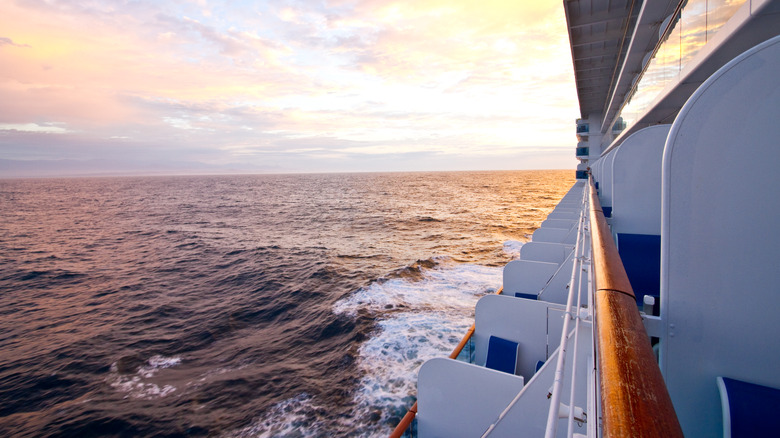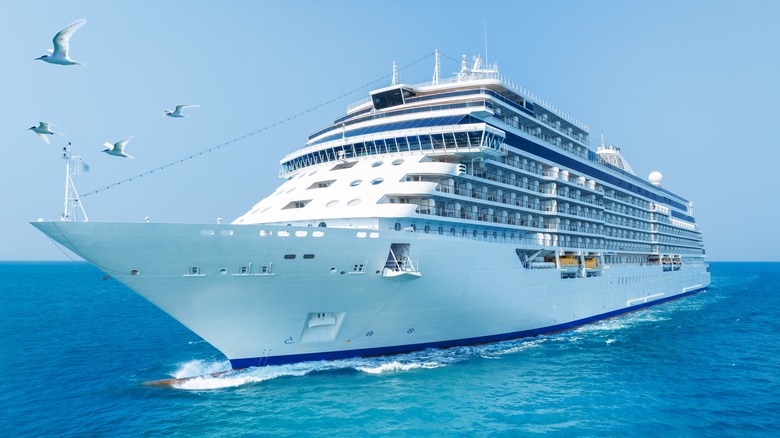When traveling by plane, you might notice mysterious code words used by flight attendants. Cruise ship crews, too, use code words to relay important messages, though they’re often not the same ones you might hear uttered at 30,000 feet in the sky. Case in point: code Oscar.
According to Spencer Aronfeld, a lawyer who specializes in cruise ship lawsuits, the phrase “code Oscar” has a dark meaning that’s unique to ships. Aronfeld explained in a TikTok video, “If you’re on a cruise and you hear the code announced ‘code Oscar, code Oscar,’ that’s how you know that a passenger’s been reported as having gone overboard.” Alternatively, you may hear the term “Mr. Mob,” which stands for “man overboard.”
The lawyer did note that some reports of people falling off cruise ships are false alarms triggered when the ship’s radars and cameras spot an object, such as litter or a lounge chair. Still, a true “code Oscar” situation can occur and isn’t as rare as you might assume.
Hundreds have fallen from cruise ships
@cruiseshiplawyer
#cruiseship #cruisecrew #passenger #cruising #maritime #lawyersoftiktok #lawyer #manoverboard
♬ tropical reggae BGM no melody – yo suzuki(akisai)
In his TikTok clip, Spencer Aronfeld claims that code Oscar accidents happen every month on cruise ships, and once someone has gone over the railing, there’s little chance of saving them. More concrete statistics were published in a report by G. P. Wild (International) Limited for the Cruise Lines International Association (CLIA): Between 2009 and 2019, 212 cases of passengers going overboard were identified. Of those, 48 passengers were rescued. That comes out to, on average, over 21 overboards per year and a 23% survival rate.
However, as most who have cruised before know, it’s not that easy to fall off. It’s highly unlikely for a cruise to tip over, and tall railings are placed throughout the decks to prevent accidental falls. Brian Salerno, the senior vice president for maritime policy at the CLIA, told The New York Times, “The vast majority of cases are either reckless behavior or some form of intentional act.” Salerno added, “People don’t just inadvertently fall over the side of a ship.” According to the article, drunkenness is often to blame, as is simply climbing on a ledge or leaning a little too far over a balcony railing. Sadly, some passengers also plunge into the water of their own volition.
What happens if someone falls overboard?

When a passenger falls off a cruise ship, the crew should be immediately notified by the vessel’s radars, triggering the “code Oscar” alert. However, this doesn’t always happen, depending on the ship’s technology. In 2016, a woman fell from a cruise ship pool deck in the middle of the night, and though a camera captured her fall, the footage allegedly wasn’t viewed until the next day, after her friends reported her missing to the crew.
If the cruise staff are alerted of the fall when it occurs, however, you’ll likely hear an emergency announcement and notice crew members springing to action. The ship may turn back in an attempt to find the fallen passenger, and the cruise workers will likely use searchlights to scan the water. Dr. Simon Boxall, an oceanographer at the University of Southampton, told The Telegraph that what happens in the seconds following the fall usually determines the cruiser’s chances of survival. “If you fall from a great height, not only do you risk breaking a limb as you hit the water, but it will knock all the air out of you and you can drown very quickly,” he explained.
If you see someone fall overboard on your cruise, or if you notice a passenger behaving recklessly around the ship’s railings, say something. Call for help and notify a cruise employee right away to help prevent the unthinkable.

